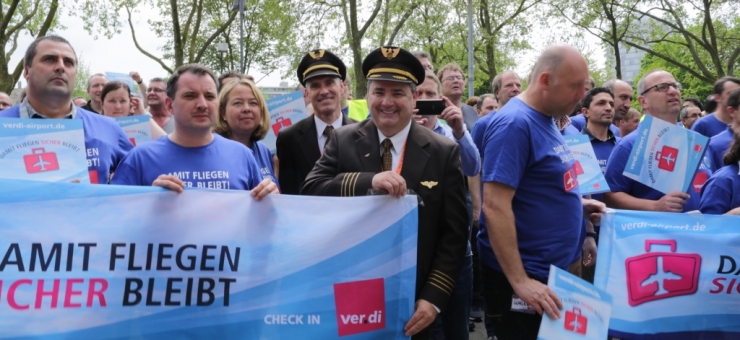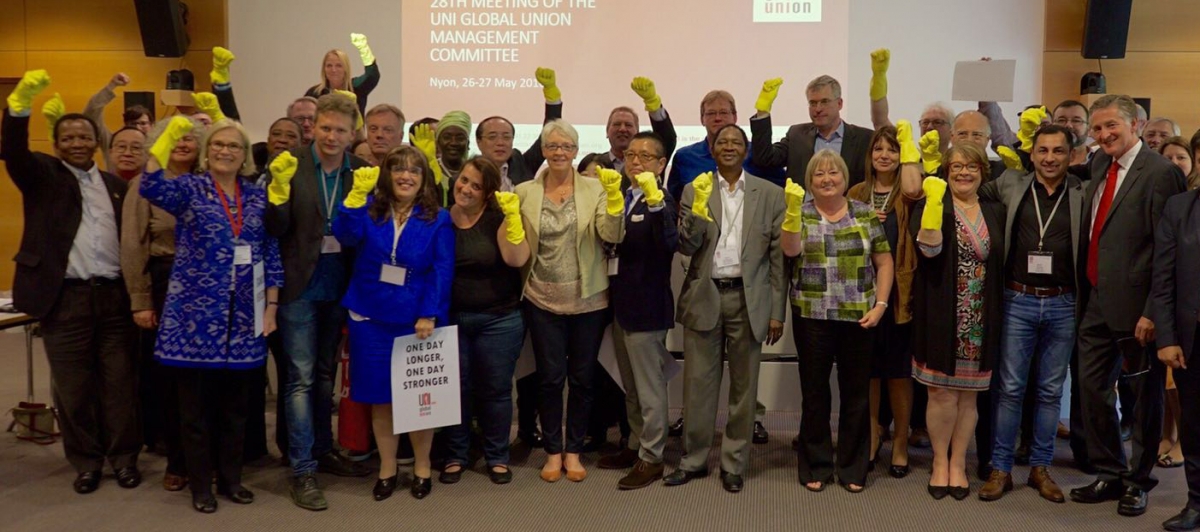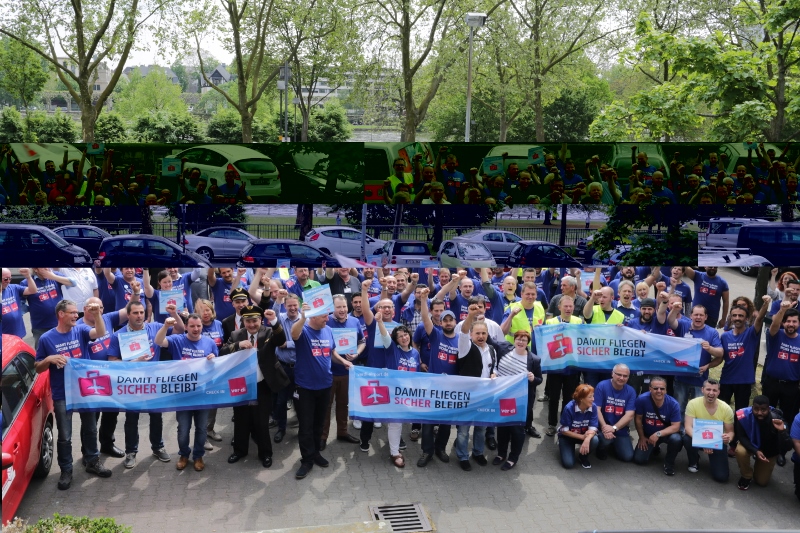Airport workers unite for justice and safety June 1

Airport workers will unite across borders Wednesday, 1 June, to deliver the message that while airlines and airports are getting richer their workers are being paid less, worked more, and having their job security torn away. Workers will be flying banners and leafleting in over 30 airports around the world to deliver their message – supported by a new research report – to the public and to the members of the International Air Transport Association (IATA), whose AGM begins on Wednesday June 1.
The research (attached and at http://goo.gl/XB4Uy7) shows that although the global airline industry is expected to make record profits of USD36.3 billion this year, airlines have created a race to the bottom, putting airport workers, safety and the quality of services under pressure.
The report is being released by a new union group called Airports United, which is determined to secure economic justice and job security for those helping build the industry’s success. Photos from the events will be posted at https://goo.gl/AIEw5I. You are invited to use them.

UNI Global Union’s Head of Property Services, Alice Dale said, “The report shows that airports and airlines are taking workers on a race to the bottom. UNI Property Services members, including cleaners and security guards are feeling the brunt of this irresponsible business model. The public are also being adversely effected. UNI stands in solidarity with all airport workers and demands the airport and airline management reevaluate their priorities.”

International Transport Workers’ Federation General Secretary Steve Cotton applauded the new group. He stated, “Airports United is made up of the workers who are the backbone of this successful world industry. In return they’re being worked harder, for less, without job security.
“More and more airline and airport services are being farmed out to subcontractors where all too often working conditions are poor. This has led to high staff turnover and an inexperienced workforce. The workers themselves tell us that this is leading to flight delays, an increased risk of security breaches – newer workers are almost twice as likely to be unwittingly involved in these – and corners being cut as workers race to meet turnaround times with fewer and fewer staff, putting personal and aircraft safety at risk.”
Mr Cotton concluded, “This new emerging network represents tens of thousands of airport workers in over 100 airports globally and aims to grow significantly over the next few years. It is launching with a clear mission to improve the industry for all concerned. The ITF is proud to back it.”
Following the events on Wednesdy June 1stm there will also be a press conference on Thursday 2 June, at the IATA AGM in Dublin, Ireland. Airport workers in work clothes from Ireland and around the world will leaflet attendees, and a press conference will be held to explain the research and Airports United’s mission. The leaflet can be seen at http://goo.gl/GXzyEZ.
The press conference will take place at 11:30 on 2 June in the Ailesbury Room of the Clayton Hotel Ballsbridge, Merrion Rd, Dublin 4 (www.claytonhotelballsbridge.com), just minutes from the AGM. You are invited to attend.
The press conference will be hosted by Siptu (Services Industrial Professional and Technical Union). If you wish to attend please drop a line to smillar@siptu.ie and dawson_sam@itf.org.uk
You can also follow the events on 1 and 2 June on Twitter via the hashtag #AirportWorkers and at the dedicated Flickr site https://goo.gl/AIEw5I.
At time of going to press actions will be taking place at major international airports in the following countries, with more confirming later today: Argentina, one airport; Australia, four airports; Brazil, one airport; Germany, nine airports; Ireland, one airport; South Korea, one airport; Sweden, one airport; the Netherlands, one airport, the USA, 12 airports.
Airports United brings together aviation workers’ unions from Australia, Germany, Sweden, the Netherlands, and the USA. The unions are the: FNV, SEIU, Swedish Transport Workers’ Union, TWU, UNITE HERE, and ver.di. Airports United is supported by the International Transport Workers’ Federation (ITF) and Uni Global Union.
UNI Global Union represents 20 million workers from over 150 countries worldwide from skills and services – the fastest growing sectors in the world of work. UNI's mission is to build power for working people in service sectors world-wide through the growth of unions and expansion of collective bargaining; to improve the working and living conditions for workers; and support decent jobsfor all and sustainable economic growth.
The ITF is an international federation of some 700 trade unions in 147 countries worldwide, representing nearly 4.8 million transport workers, including over 650 thousand aviation workers. Uni Global Union represents 20 million workers from over 150 countries in the skills and services sectors.
ENDS
More information
On 1 June Airports United will launch a new research report Record profits for airlines;
airport workers under pressure (see http://goo.gl/XB4Uy7). This is the report’s executive summary:
The global airline industry is in excellent financial health. Record profits of $36.3 billion are expected in 2016, and passenger growth is robust at 6.9%. Despite their strong financial performance, airlines have created a race to the bottom that is placing airport workers – and airport safety and service quality – under immense pressure.
Airport workers* now face a working environment marked by stress, irregular working patterns and wage levels that are often insufficient to meet their basic living costs.
Airport staff numbers have been repeatedly reduced, leading to an intensification of work. For example, at Hamburg Airport in Germany, there were 531 workers per million passengers in 2006; by 2011 this figure had been reduced to 466 workers per million passengers.
Workers have also faced a steady decline in wages. A new normal has emerged in which airlines have subcontracted airport work to new subsidiaries or agencies with markedly inferior terms and conditions. In Australia, Qantas fired 5000 workers and replaced them with 9000 part-time workers employed through its subsidiaries. In the US, wages for airport workers fell by 19% in real terms between 1991 and 2001. As a result, workers are often unable to afford basic necessities, even health insurance.
The rapid decline in the quality of jobs has led to high turnover, with potentially adverse consequences for the safety and security of airports. In 2014, a memo written by airport staff at SeaTac Airport in the US expressed concern about the large number of inexperienced staff whose rate of safety and security violation was nearly twice that of more experienced colleagues. In Australia there has also been concern over how high turnover leads to a disproportionate number of workers on temporary security badges and without proper training.
Well-trained airport workers are vital to passenger safety and wellbeing. They are the first to respond in an emergency, they provide vital assistance in bringing passengers to safe areas of the airport, and are critical to making sure that the most vulnerable, including elderly and disabled passengers, are always looked after. The decline in standards is easily preventable. Cost cutting is driving this race to the bottom, but airlines have the power to stop it and put in place a sustainable employment model, one that is capable of retaining a skilled and experienced workforce. It is time for airlines to redress this serious problem at the heart of the global aviation industry.
*Passenger services (often referred to in the industry as ground handling) are broadly comprised of all the services aircraft and passengers require between landing and take-off. They include: security, wheelchair assistance, fuelling, cargo and baggage handling, cabin cleaning and passenger check-in
Richard Elliott
Director of Communications
Mobile: +41 79 794 9709
UNI global union
8-10 Av. Reverdil
1260 NYON
Switzerland
Tel: +41 22 365 21 30
Fax: +41 22 365 21 21
richard.elliott@uniglobalunion.org
www.uniglobalunion.org

